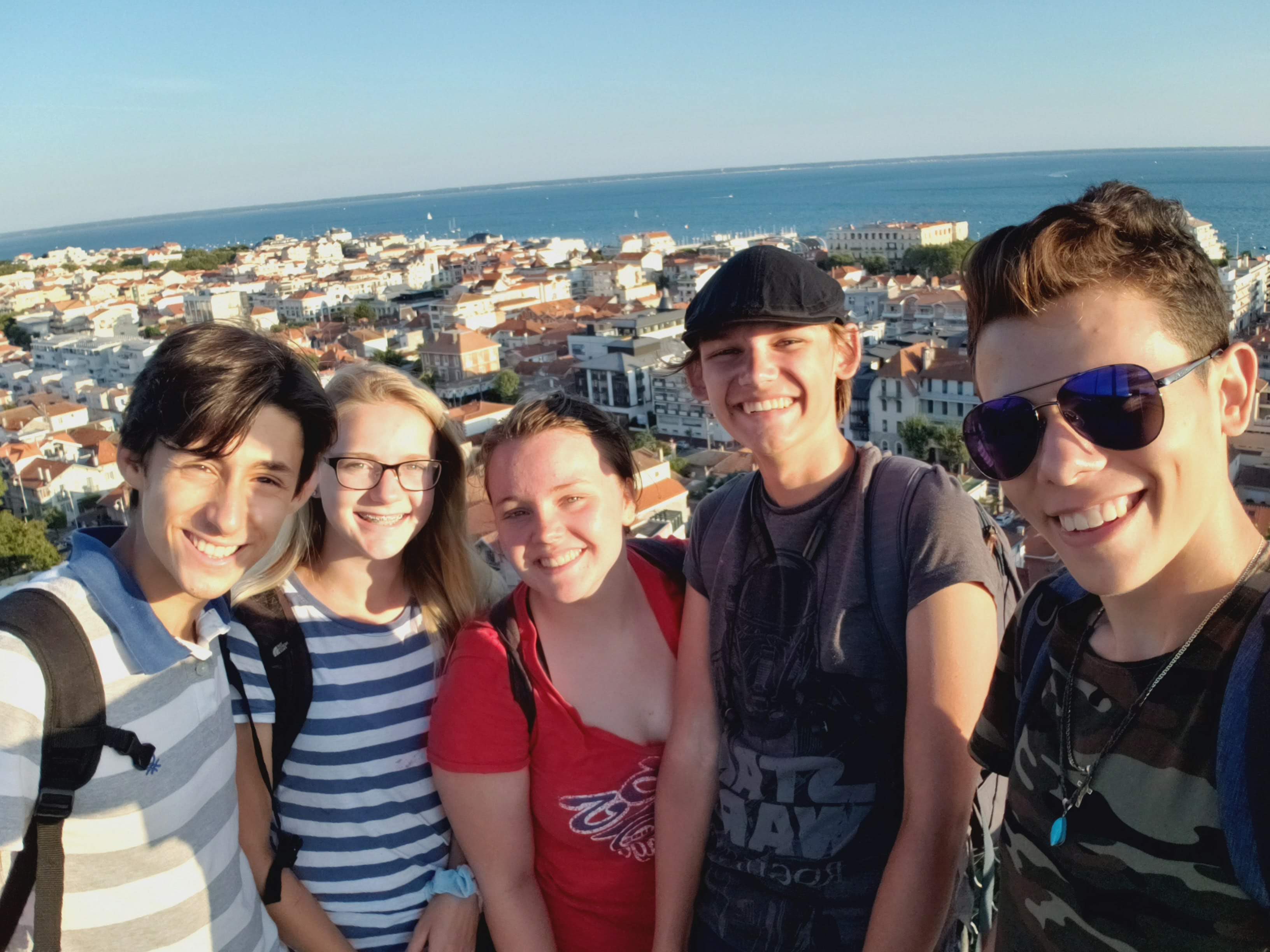Traveling abroad during your high school summer break doesn’t just give you bragging rights- it can also give you school credit. We interviewed alum Noah Torres about his two summers in France, visit from his host brothers, and college applications.
Noah: I’m Noah Torres, I’m from Los Angeles. I’ve been here all my life, and I did the French summer language camp in Arcachon for the past two summers, 2019 and 2018.
Alison: If we’re not mistaken, you lived with the same host family two years in a row.
Noah: When I was filling out the application for the first time, I was writing down on my preferences. And I got matched with an awesome most family. The mom, Marie, and the dad, Kristof, and I had three host brothers. One was 16, his name was Roman. I was 17 the first time. And then I had Baptiste, who I believe was 12, and Axel, who was 10. So it was a couple of little kids and one that was my age. It was just really cool to match the energy and they were really nice all the way through. Both years I was with them.
Allison: They’ve come to visit you as well, right?
After the first summer- it was only two weeks with him. We developed that bond, but it was still like, there’s that language barrier and it took me maybe the first week to really get comfortable with them. Then I started talking more and they would use what English they knew if they needed to and I would use what French I knew.
We stayed in touch after when I came back home. Just talking about how things were. There were a few fires in California, so they were all checking up on me.
And then I wanted to go back because I had such an amazing experience, but I wasn’t sure if I wanted to try something new. And they told me that they would love to host me again. And I was like, ‘Oh, that’d be awesome!’ I don’t have to worry about anything else. I’d love to go back and see them.
That second time I went it was a lot smoother. We just kind of picked up from where we left off and it was kinda like they were my longtime family friends. It was awesome to be with them again.
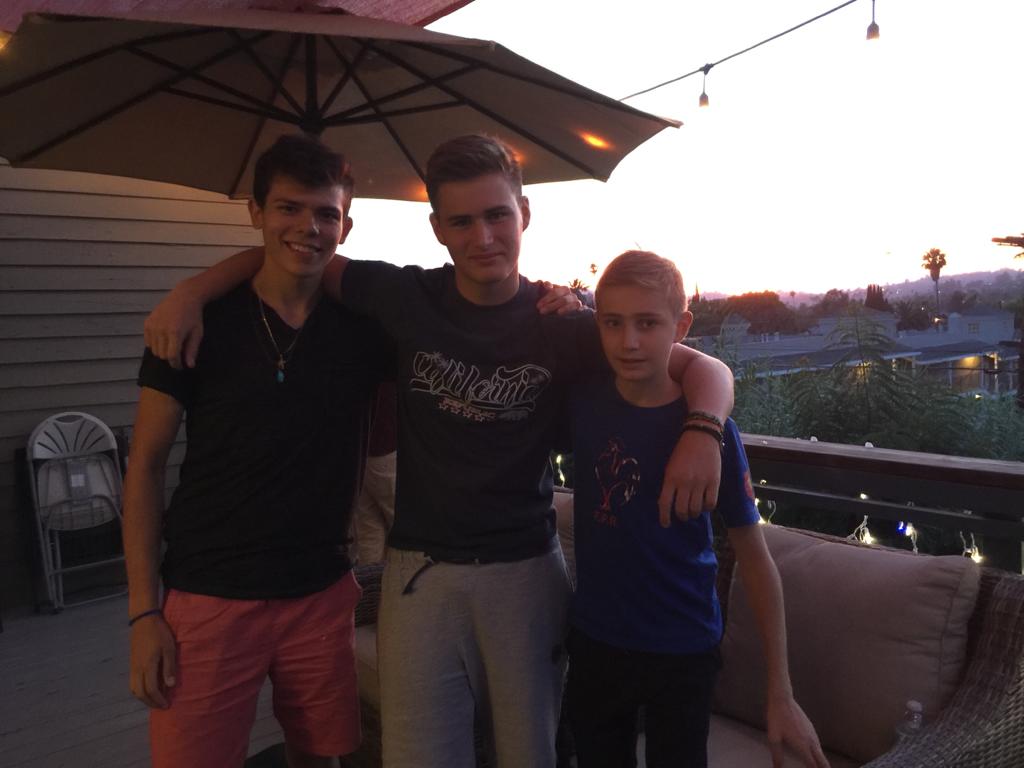
Connor: You and I were talking last summer, Noah, and you were mentioning that there was a possibility of your host brothers potentially visiting you in the United States. How have those plans developed?
Noah: It was Ramon and Baptiste. Roman- I think he was 17 at that time, 16 or 17. Baptiste was I think 12 or 13. They actually came back with me when I came back to the US. Their mom just bought tickets for the same plane and we kind of coordinated that. We made sure we had the same flight number.
They were here with me for I think two and a half weeks. We showed them around LA; the landmarks, the beaches, and they loved it.
Connor: Did you translate English to French the whole time? What were the language barriers?
Noah: It was hilarious because they knew a little bit of English, but they’re crazy soccer fans and they were really proud about winning the world cup the year before. And my dad is a really big soccer fan. Names are universal, so they were just throwing names out there and then, like, playing charades. There wasn’t much of a language barrier there.
They were using everything they knew. It was just them trying to just really have fun. We kind of forgot about the language barrier. We would do charades, we would talk however we could. It was just fun.
Connor: A lot of people get really nervous about language barriers. You’re like, how am I going to communicate who I am to this other person? But honestly, what happens is that you all kind of meet up at this barrier together and you figure it out.
Noah: Yeah, exactly. They weren’t expecting me or anyone in my family to be fluent. They went in, like, trying to find how they were going to communicate. It’s not like there’s any expectation that you need to meet, they’re just ready to talk to you. It’s about having fun and getting to meet them. It’s not about, like, criticizing anyone.
Connor: How did the visit of them in America affect your parents in America?
Noah: Actually, my mom has this thing where every year she wants to go to Costa Rica, just for vacation purposes. And now she wants to go visit them in France because it was just two weeks, but like everything, getting to know them, trying to communicate, it was just fun and hilarious. She actually cried when they left, so yeah, we, we really want to get back and see them.
I wanted to see them winter break, but college apps kept me back. So I’m hoping to go back.
Connor: There’s something so special about international relationships.
Noah: Yeah, it’s like if you’re all the way over there and that’s all you know for two weeks, they’re essentially your family. And that’s kind of how you see them when you go over there. They are all you know. So yeah, it’s a really, really strong and unique relationship. They’re not just regular friends or anything.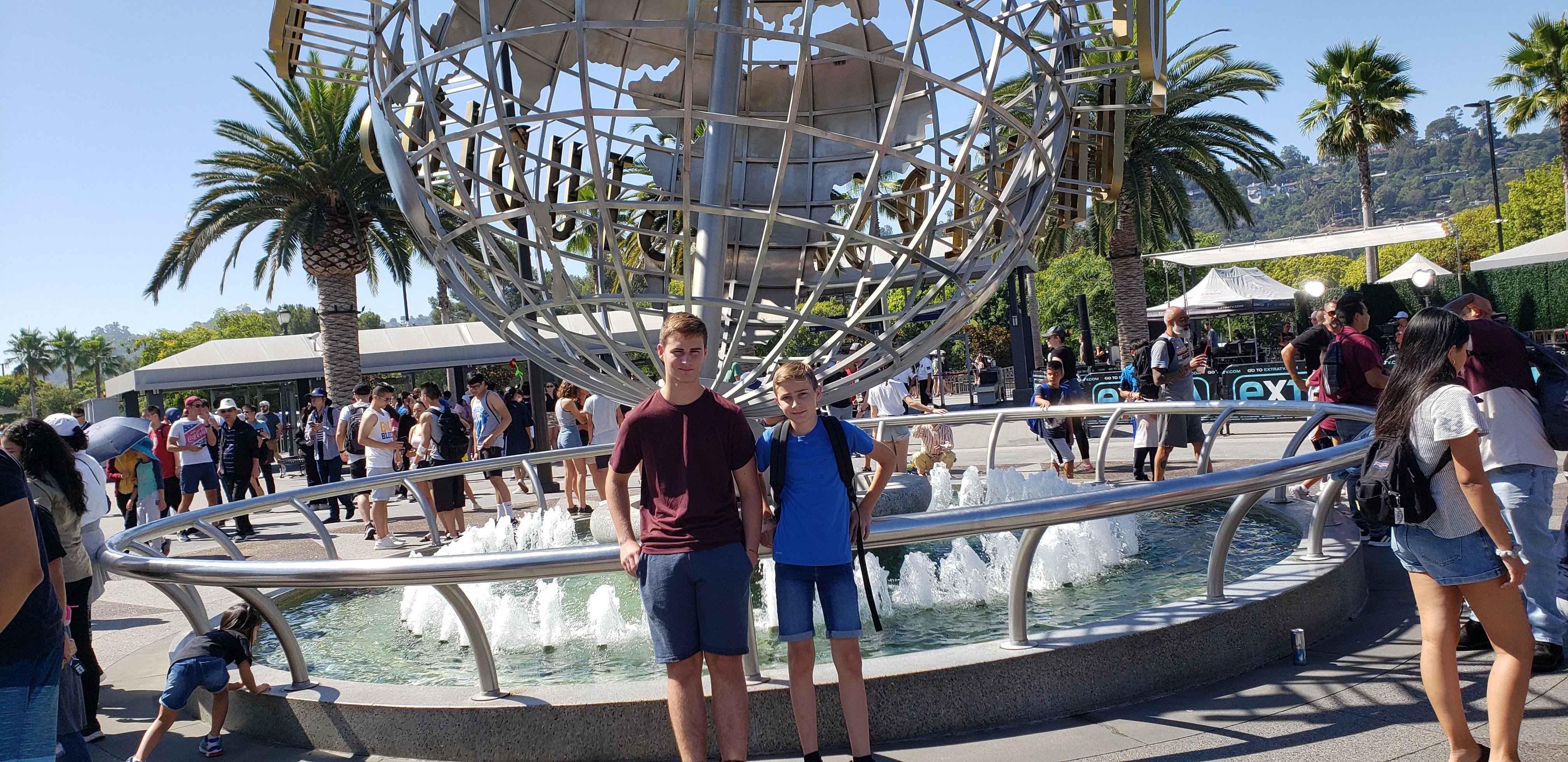
Allison: What do you think is the biggest thing you’ve learned from living with them? Either about yourself or about France.
Noah: Well, I learned a ton of French, and it’s like just the way I’m able to speak it. And that’s a given. If somebody goes over there, you’re going to learn the language.
But what I really learned is, like, how to be independent and out of make new friends. Because it’s not just your host family, it’s also your classmates, and they’re from all around the world. So you’ll have people that speak your language, maybe, maybe not. They’ll speak a ton of other languages. They all want to meet you because you want to know about the other country.
So once you immerse yourself in that kind of environment, you’re going to develop some leadership skills, which I think I definitely did. And definitely independence because you’re counting on yourself to make these friends, to get through it.
So I’m a lot more confident and independent. I want to just leave my family and go like backpacking or something. That’d be awesome. But then I also want to take them to see all of these different cultures too. So it’s just really, don’t know, becoming more confident in myself I think.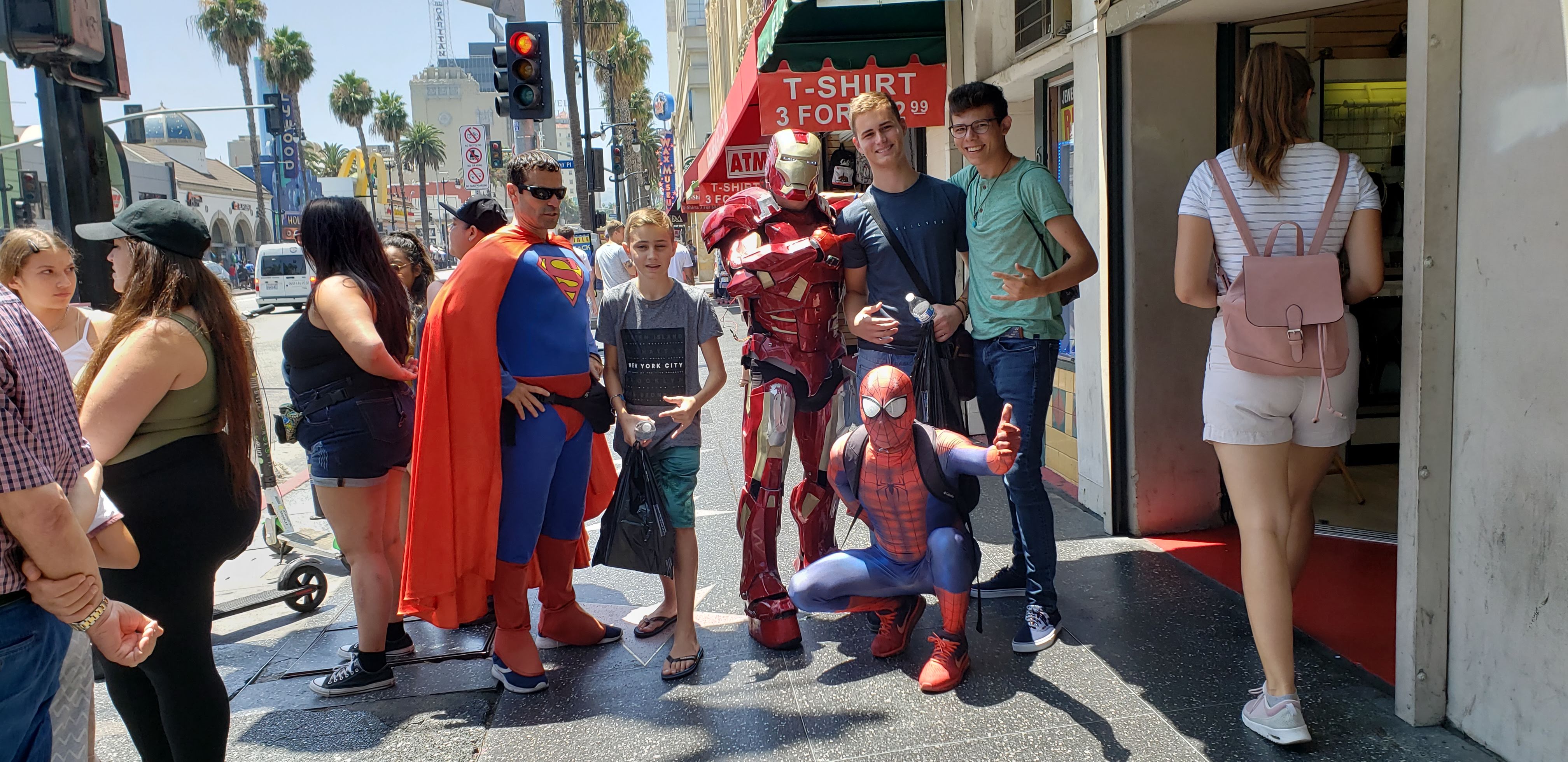
Connor: And how have you found that that confidence has like manifested back in the United States?
Noah: The first two years of high school really slow for me. I was still getting used to high school. And then going into junior year, I immersed myself in that language camp.
When I came back, I was a lot more adventurous. I started taking more extracurriculars and afterschool classes. Because when you’re here you think, ‘go to school, go home.’ But then once you take yourself independently to another country, get that there’s more than that. I can stay here, I have time, I can do more things with my life.
In terms of classes also, I’ve definitely been more outspoken. I feel like I have more to say and my eyes are a little bit more open. It’s really just trusting myself that I can do more.
Allison: I’m so excited for wherever you end up in whatever path you end up taking.
So speaking about the French that you learned, can you talk about comparing the first year, your French learning, versus the second year? And how one built off of the other?
Noah: I had only one year of French in school going into that first summer I was there. So that was just one year. It’s not a lot, but you know, it’s the basics.
But when I was there, I found that I didn’t really need to like memorize every single congregation like they wanted me to do in school. It was just when you’re there, you learn how to speak at like a local. You get, I don’t know, I’ve just been calling it, ‘street fluent.’ You start speaking how they speak. It’s not really like what they teach in school.
But it was still really rusty because I wasn’t too comfortable transitioning into it. I was picking up what I could, and when I came back I was practicing all these new words I’d never heard of before. Even some French slang here and there.
Then the second year I went back already knowing like, ‘oh, I’m going to learn it again.’ I’m not going in thinking I know everything. I’m going to go in and try to pick up as much as I can. Going it with that, being really open to it, that boosts you a lot. So instead of just having one week transitioning and one week learning, going in having both weeks, ‘I’m ready to learn.’ It was really, it was a lot more powerful and I was able to speak it a lot more fluidly.
Allison: What’s your favorite thing to say in French?
Noah: It’s ‘luper” but just because there’s a story to that. That means kind of like, ‘lost’ or ‘missed.’ One time on the way to school, I missed the train and I said that I ‘perdu’ the train. Like I kinda, I don’t know where I put the train. And I told the teacher that when I walked in and then she corrected me and she was like, ‘it’s luper.’ And I was like, oh, that’s cool. That’s a cool way to learn a word. I missed the train. And then there’s just a story to that, I like that word, kind of lost.
Allison: Yes, I love the stories where you remember the exact moment when you learned a word or you always think of that person or that moment. That’s really fun.
Connor: And also realizing that like direct translation a lot of times it doesn’t make any sense. I have always heard out, I want to know your thoughts on this. I also speak another foreign language, so it is Alison, and part of that process is learning that translation doesn’t make sense. And a lot of the times people say the best way to feel comfortable with speaking that foreign language is to stop translating in your head and try to let it kind of flow freely. Do you have words on that or do you have any other advice for people who are learning a foreign language and what worked best for you?
Noah: Yeah, it never actually really thought about that, but I think I just kind of did it, like it just kind of happened. I stopped trying to, I don’t know, word it in English and then in French. And it started becoming more natural to where I would just search for the words in French. I wouldn’t even consider English and I was talking.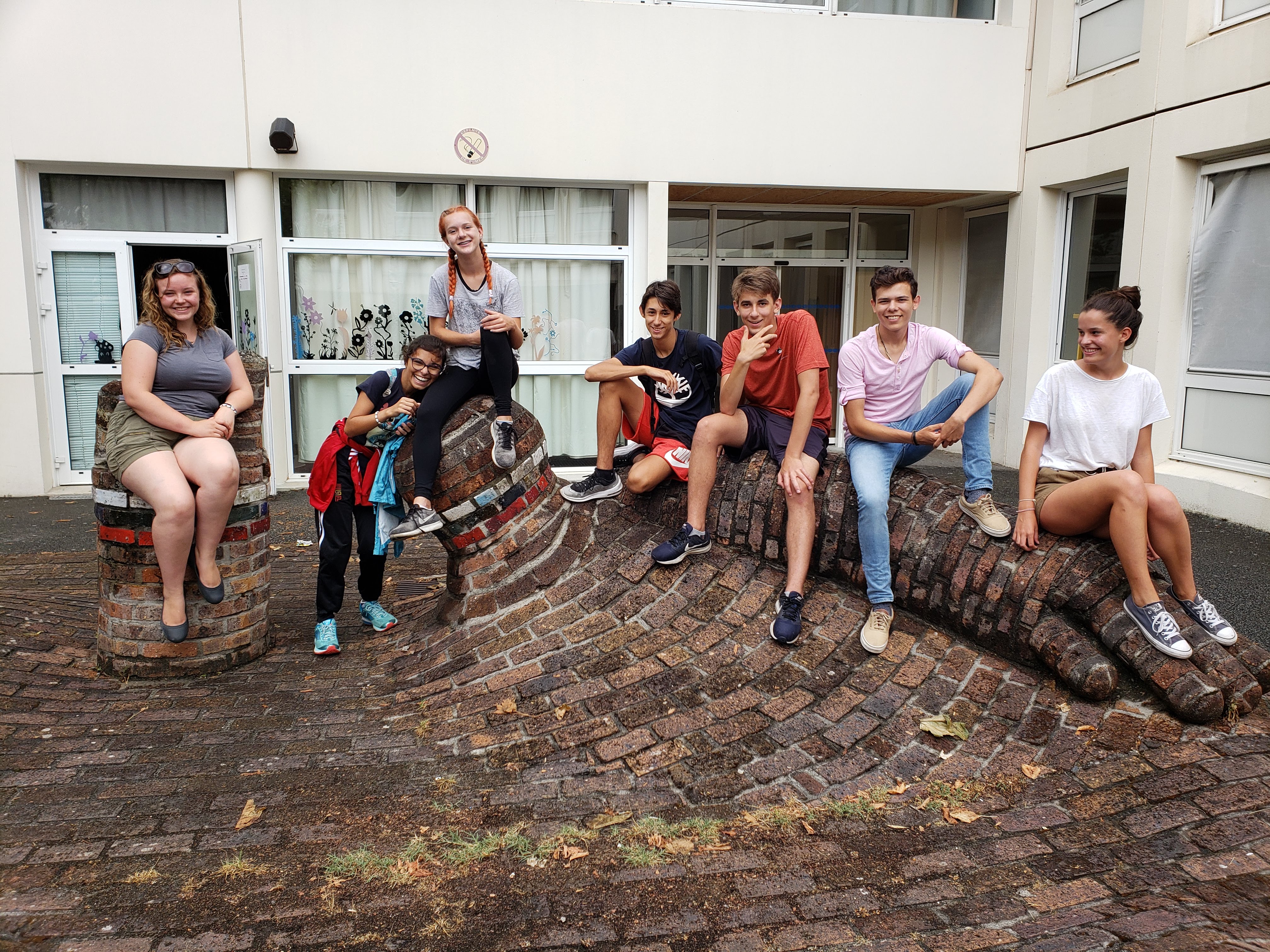
Connor: Are you in French, in school in Los Angeles?
Noah: No, actually. What frustrated me was I had that one year of French and the teacher retired. So sophomore year I had Spanish, Spanish 1, and I already kinda know Spanish because my family is Hispanic. I didn’t want to go through that, so that’s when I started searching for language camps.
What t I’ve learned is actually mostly from the language camps and maybe a little I retained from that one year of French.
Connor: What are ways, if any, that you’ve explored of maintaining your French? Because it can be really easy to lose it, right?
Noah: I’d say if possible any friends you’ve made or your host family, just messaged them. It can be casual, you don’t need to email or anything. Just Instagram, Facebook, anything, just messaging them. I know it’s not speaking it, but writing it, it’s very similar. you can write casually and it’s really easy.
Other than that, I bought the French book. It is American French, so it’s going to be like the same thing as in France, but it’s still French. So just looking at that and seeing if I know these words, doing all the exercises, doing that, if I can.
The most valuable part has just been, you know, calling the host family or messaging them. Just keeping in touch. And that helps a lot.
Allison: So Noah, you got credit from your teen summer language camp, didn’t you?
Noah: I did, for both of them.
Allison: And how did you go about that process? So well, first, what did you get? What credits did you get and how did you do that?
Noah: So for the first summer, I got credits for French I A, which is one semester. And then the second summer I got credits for French II B, which is the second semester, and that together is one year.
So what I did to do that, the first thing I did, I went to the head counselor, the assistant principal of counseling, and I told him just casually, briefly, I said I did this program. I went to France for two weeks, and there were French classes. Can you help me get credits? I’ll write you a letter. And I asked you for a letter as well to give to him.
And so I came back a week later and gave him my letter where I explained what I did, so he knows it’s personal from me, and then your letter as well.
After that, he took about a week before he got back to me. And he said that he would need to talk to you directly. So I gave him your contact information and you just handled that. And it was really amazing, really quick.
What he did is he sent some forms from my school district. I don’t know if every school district is going to have this, but what it is, is it’s learning a language from an outside source. And he was able to write down Greenheart Travel and he was able to get me those credits as if I actually took them in school.
Allison: That’s awesome. So did that save you some credits or did you have another free period or how did that affect your graduation?
Noah: So I actually now have, technically I have three years of language. So that’s one year of Spanish and two years of French. Those definitely saved me some time because- I did get through Spanish one- but with those credits from the French summer language camp, I got extra credits because I had taken Spanish, which I did not want to take, and then summer credits on top of that.
So I had two free periods of this year and I used that to take peer counseling for college application. So I had a lot of extra time. It was really cool to say that I have extra credits and they came from me going outside of the country.
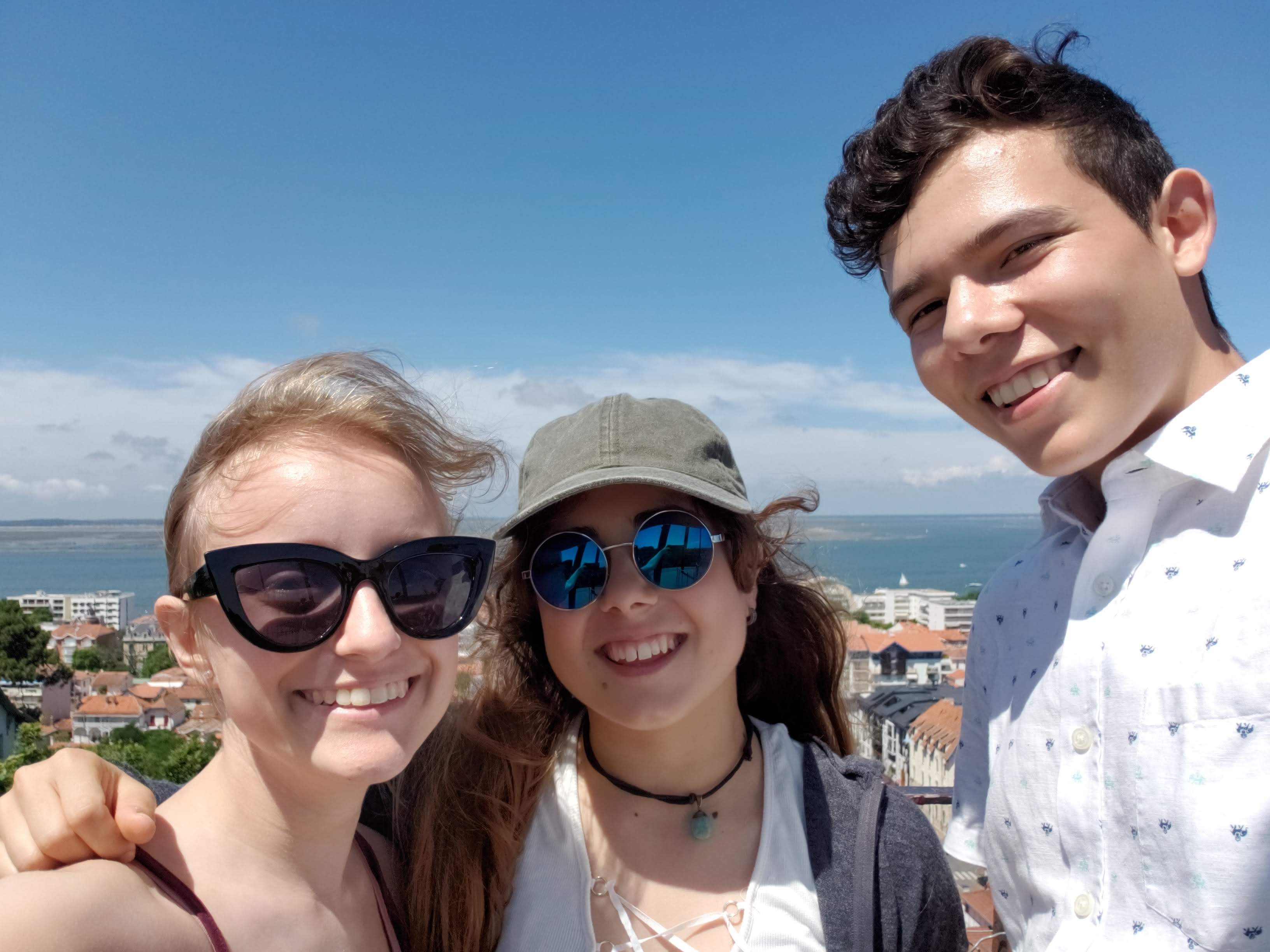
Connor: If you do go to university, do you think maybe French would be involved in that and some sort of way or international culture?
Noah: I always spend on going to a four-year university, but after the first language camp, it was important to me to kind of find international opportunities for studying abroad. That wasn’t necessarily a make or break decision for me, but I did have that to filter through my top college choices where I applied to see if they would have opportunities for me to study abroad.
I do want to go into international business, and part of that was inspired by a Greenheart Travel and going outside of the country because I want to be able to travel when I’m older.
I really do want to take language courses. It’s not something that I’d major in, but it would be amazing to be able to take a college course on the side. French, or like, I’d consider any language actually. I just to be able to learn more so I can travel more and communicate more to meet more people and more families. So that definitely impacted like what I wanna do and where I want to go.
I did apply actually to two universities abroad, one in Ireland and one in Scotland, which I would not have done if I didn’t have that confidence built up. And it’s a little late now, but I’m still looking at universities in France. It’s just a little more complicated because it’s a whole separate application, but I honestly would not mind going to study all four years abroad.
Connor: On how many applications, that you’ve sent to universities, did you mention your experience in France?
Noah: I might’ve been all of them. For UCs it’s just one application. So they do a holistic review where they want to see every part of you, like every extracurricular you’ve done. And I wrote down, “Greenheart Travel Language Camps.’ They wanted me to talk about why it was important to me, why I listed it there. And then for private schools, it’s the Common App, That’s where I put down all of the language camps, and they wanted me to write, I think maybe 25 to 50 words on what it was and where I went. So it was every single application.
Connor: I do have a final question now. It’s a two-parter too. Basically just imagining either sitting down with your former self or imagining sitting down with a student and maybe their parent who are nervous about this experience and are like, ‘what am I going to do every day and how am I gonna maneuver public transportation?’ all these things that seem really scary. What would you say to these people or your prior self?
Noah: What I was most worried about was maneuvering the airport, like small things. Just because I’d never done this by myself. The airports- they want you to get to where you want to get to. All the transportation, it’s all there for you. Everybody’s going to help you. They want you to get to your flight, you paid for it. So in France, the transportation there, it’s really… Actually, I liked being in France. The Metro is so much cleaner, or the train was so much cleaner.
You can’t really worry about what you’re gonna do in France and what you’re going to learn because everybody’s gonna take away something different. They’re gonna learn something different about themselves.
You just kinda have to accept that you’re there and accept that it’s a learning experience. You can’t really go and having expectations like, ‘this is what I want to learn, that is telling you to learn it.’ You have to just take it in as you go because it’s going to be a different experience for everybody, where you are and the type of people that you’re with.
Like accepting it’s a learning experience and nothing is going to be exactly how you envisioned it and that’s going to help you the most with all this stuff that comes with it, like the transportation and getting there, airports.
Allison: Thanks for sharing everything that you learned and everything that you want to do in the future. Like I said, did you get any, we’re so excited for you and we think you’re amazing and we’re so happy that you are a Greenheart Traveler.
